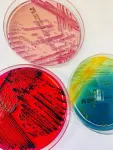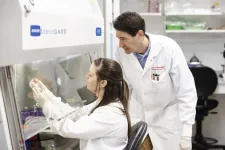(Press-News.org) Unknown germs are a common occurrence in hospitals. Researchers at the University of Basel have spent many years collecting and analyzing them. They have identified many new species of bacteria, some of which are significant for clinical practice.
Bacterial infections can be treated more efficiently if the cause of the disease is known. In most cases, all it takes to identify a pathogen is an analysis in a medical laboratory. Sometimes, however, the standard methods are insufficient – for example, if the species of bacteria has not yet been classified or is particularly difficult to grow.
A team from the University of Basel and the University Hospital Basel has been collecting and analyzing patient samples containing such unknown germs since 2014. The researchers have discovered more than thirty new species of bacteria, some of which are associated with clinically relevant infections.
Complete genetic analysis
Overall, the team led by the microbiologist Dr. Daniel Goldenberger analyzed 61 unknown bacterial pathogens found in blood or tissue samples from patients with a wide range of medical conditions. Conventional laboratory methods, such as mass spectroscopy or sequencing a small part of the bacterial genome, had failed to produce results for all these isolates. That is why the researchers sequenced the complete genetic material of the bacteria using a method that has only been available for a few years. They then compared the identified genome sequences with known strains in an online tool.
Out of 61 analyzed bacteria, 35 were previously unknown. The researchers classified the remaining 26 strains as hard to identify: either their genome sequences had only been added to databases recently or a correct taxonomic description of the pathogens had only been created a very short time ago. An evaluation of the patient data showed that seven out of the 35 new strains were clinically relevant, meaning that they can cause bacterial infections in humans. “Such direct links between newly identified species of bacteria and their clinical relevance have rarely been published in the past,” said Dr. Goldenberger.
Cause of rare infections
Most of the newly identified species belong to the Corynebacterium and Schaalia genera, both gram-positive bacilli. “Many species in these two genera are found in the natural human skin microbiome and the mucosa. This is why they are frequently underestimated, and research into them is sparse,” explained Dr. Goldenberger. They can, however, cause infections when they enter into the bloodstream – due to a tumor, for example.
One of the hard-to-identify pathogens might be clinically relevant, too. It was found in the inflamed thumb of a patient after a dog bite. A Canadian research group also recently isolated this bacterium from wounds caused by dog or cat bites. “This has led us to assume that it is an emerging pathogen which we need to monitor,” said Dr. Goldenberger. The Canadian researchers appropriately named the bacterium Vandammella animalimorsus (animal bite Vandammella) in 2022.
Naming their new species is the next item on the Basel team’s to-do list, too. They are working closely with Professor Peter Vandamme from the University of Ghent, a specialist in bacteria classification. Two of the bacteria have been named already. One is Pseudoclavibacter triregionum – referring to Basel’s location near the borders of Switzerland, France and Germany.
The project started by Daniel Goldenberger’s team is far from complete, however. The researchers continue to systematically collect and sequence unknown pathogens found in patient samples from the University Hospital Basel – another twenty-plus new species have been detected already. “We have noticed a major dynamic here: thanks to technological advances in bacteriology, much more is being published about newly discovered species of bacteria,” explained Dr. Goldenberger. This development will make it easier in future to correctly diagnose infections caused by rare pathogens and treat them effectively from the outset.
END
More than thirty new species of bacteria discovered in patient samples
2024-01-08
ELSE PRESS RELEASES FROM THIS DATE:
Where do patients choose to undergo breast cancer surgery, and do these choices drive health care inequality?
2024-01-08
Including patients as partners for making decisions about their medical treatments is an important aspect of patient-centered care. A new study from England examined choices that patients with breast cancer make when considering where to have surgery for their condition and assessed how policies that offer such choices might affect inequalities in the health care system. The findings are published by Wiley online in CANCER, a peer-reviewed journal of the American Cancer Society.
For the study, investigators analyzed data from the National Health Service (NHS), the publicly ...
Some mosquitoes like it hot
2024-01-08
Certain populations of mosquitoes are more heat tolerant and better equipped to survive heat waves than others, according to new research from Washington University in St. Louis.
This is bad news in a world where vector-borne diseases are an increasingly global health concern. Most models that scientists use to estimate vector-borne disease risk currently assume that mosquito heat tolerances do not vary. As a result, these models may underestimate mosquitoes’ ability to spread diseases in a warming world.
Researchers led by Katie M. Westby, a senior scientist at Tyson Research Center, Washington ...
Out-of-pocket cost increase could put HIV prevention medications out of reach
2024-01-08
PHILADELPHIA – Increasing patients’ out of pocket costs for HIV pre-exposure prophylaxis (PrEP), medications, which have been shown to dramatically reduce the risk of HIV infection, could lead to a significant reduction in PrEP use and a rise in HIV infection rates, according to a new study co-led by researchers at the Perelman School of Medicine at the University of Pennsylvania and Johns Hopkins Bloomberg School of Public Health.
The study, published today in Health Affairs, was designed, in part, to explore the impact that out-of-pocket cost increases could have, depending on the outcome of an ongoing court case challenging certain ...
Survey finds majority of Americans think bariatric surgery is a shortcut to losing pounds, should only be a last resort
2024-01-08
Orlando, Fla - More than two in five U.S. adults suffer from obesity, an epidemic that continues to trend upward. While bariatric surgery is an extremely effective treatment option, a new national survey by Orlando Health reveals common stigmas that may deter those who qualify for surgery from pursuing the treatment they need.
“Treatment plans for obesity are tailored to each individual patient based on things like body mass index and existing medical conditions and may include medication, lifestyle changes, counseling and bariatric surgery,” said Andre Teixeira, MD, medical ...
First ever scientific study on First World War crater reveals new details on its history
2024-01-08
The spectacular explosion of the mine at Hawthorn Ridge – a fortified German front-line position in the First World War – marked the beginning of the Battle of the Somme, and remains one of the best-known pieces of film from the whole conflict.
More than 60ft below the surface, British miners had dug a gallery for more than 900 metres from their lines and packed it with 40,000 lbs of explosives. It was one of 19 mines placed beneath German front positions that were detonated on 1st July, 1916 to mark the start of the offensive.
But the detonation of the ...
Blood flow changes in the eyes could influence visual symptoms of migraines
2024-01-06
A recent study found changes in blood flow in the retina could explain why some migraine patients experience visual symptoms. The findings could represent a long-sought observable marker for migraines that doctors can use to aid in the clinical treatment of the condition.
While patients with migraines often experience symptoms such as pain around the eye, sensitivity to light, blind spots and visual blurring, the mechanisms behind those symptoms have not been well understood. UCLA Health researchers used a non-invasive imaging technique, known as optical coherence tomography angiography, or OCTA, ...
Global scientific network highlights plant genera named for women
2024-01-06
A network of scientists across the globe have identified more than 700 plant genera named for women. This is a nearly twenty-fold increase in the number of genera linked to women before the group started working on the list.
The project, which aimed to highlight the contribution of women to botany, was the result of social media conversations about plants named for people.
What began as a simple question about how many and which plant genera were named for women evolved into a global network of scientists who built ...
UofL researchers are unmasking an old foe’s tricks to thwart new diseases
2024-01-05
When the body encounters bacteria, viruses or harmful substances, its innate immune cells, neutrophils, assemble at the site to combat the invader.
Bacteria and viruses have ways to avoid these defenses, however. Yersinia pestis, the bacteria that causes bubonic and pneumonic plague, for example, can hide from the immune system, allowing it to replicate in the body unhindered until it can overwhelm the host. This ability allowed Y. pestis to spread bubonic plague across Europe in the 14th Century, killing a third of the European population.
While plague may not be a serious threat to human health in modern times, researchers at the University of Louisville are studying Y. ...
Soil fungi may help explain the global gradient in forest diversity
2024-01-05
A paper published in Nature Communications Biology contributes to the growing appreciation for the outsize role that microbes play in everything from human digestion to crop yields: Microbes in the soil—fungi in this case—appear to be influencing forest diversity on a global scale.
Forests on Earth exhibit a marked gradient from the equator toward the poles: Tropical forests near the equator tend to include a large number of different species, whereas forests nearer the poles support less plant diversity.
One explanation for this phenomenon maintains that soil pathogens, including bacteria and fungi, help create this gradient. ...
UC Davis Health creates road map to diversify health care workforce
2024-01-05
How can health care systems increase diversity and inclusion in their workforce?
UC Davis Health, recognized by Forbes as a "Best Employer in California", has developed a road map for increasing workforce diversity across the industry. While California banned the consideration of race or ethnicity in hiring at public institutions in 1996, UC Davis Health has since come up with a holistic outreach and local recruitment plan that has proven effective. And that approach is now receiving global attention through a new case study published in New England Journal ...




